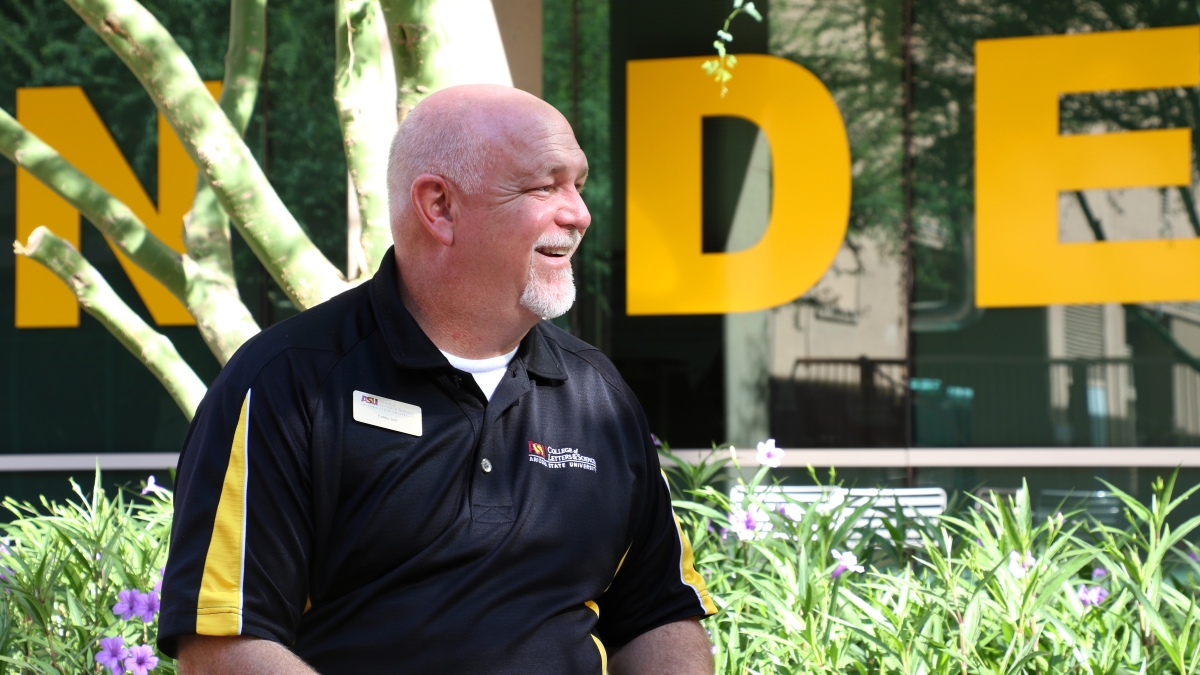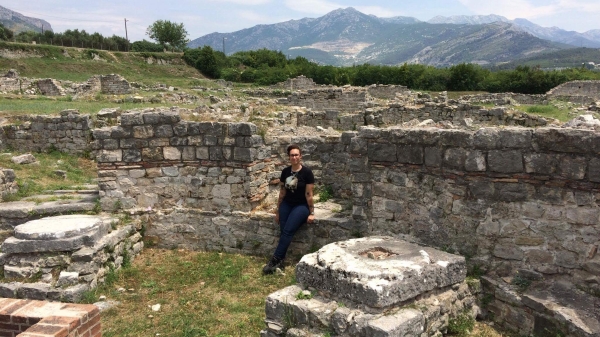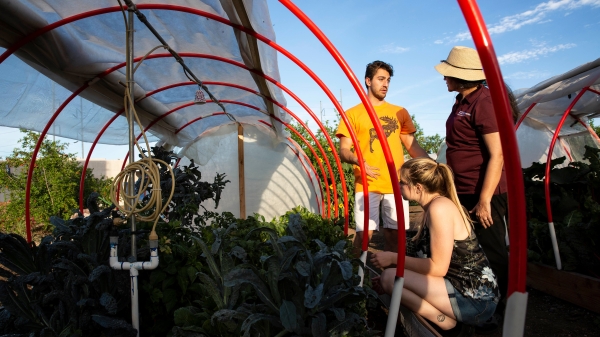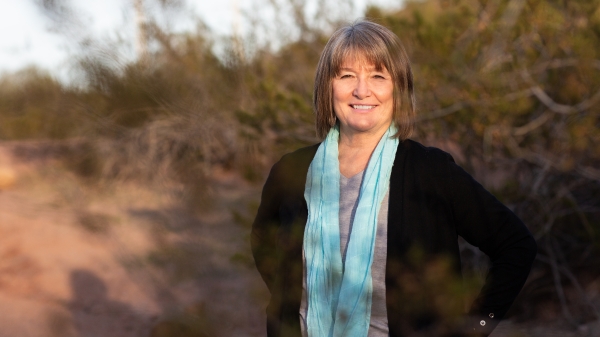ASU's Casey Self: Leader in global academic advising community

“I really appreciate all of the support I’ve had at ASU over the years to participate in NACADA,” reflected Casey Self, who gave the keynote address at the organization's annual conference, held Oct. 4-7. “This last week was definitely a career highlight.”
Photo by: David Riemer
Casey Self, a leader in the academic advising community at Arizona State University and internationally, admits he couldn’t help but go a little “Vegas” in his keynote address last week at the annual meeting of the Global Community for Academic Advising (NACADA).
The conference venue was the iconic Caesars Palace Las Vegas Hotel, and Self’s PowerPoint slideshow aptly included roulette wheel infographics, tumbling red and white dice and a green background the color of casino-table felt. He even closed with a showtune (to resounding applause from his audience of more than 3,000), bravely singing a stanza from “Wicked” that gets at the heart of the advising relationship:
I've heard it said,
That people come into our lives
For a reason
Bringing something we must learn.
And we are led to those
Who help us most to grow if we let them.
And we help them in return.
Well, I don't know if I believe that's true
But I know I'm who I am today
Because I knew you.
But he left nothing about his remarks to chance.
“I worked on the [keynote] speech for about a year,” said Self, executive director of academic advising in ASU’s College of Letters and Sciences.
He presented a dry run in April, in the form of the Kent M. Christiansen Lecture, the annual keynote for ASU’s advising community. He continued to tweak his speech and slides over the summer and got a final round of feedback from his College of Letters and Sciences advising team the week before the conference.
Getting things exactly right is what colleagues, students and parents have come to expect from Casey Self, whose name has become synonymous with the gold standard in student-centered advising — at ASU and in the international community engaged in academic advising’s continued professionalization.
“At ASU, Casey’s generally considered the go-to advising person to bring into the conversation when wrestling with something that impacts the whole university,” said colleague Therese Aguayo, director of academic services in the College of Letters and Sciences.
“Casey Self is a leader in academic advising. He understands the importance of serving students well, placing the student at the center of the advising experience, and using analytics for performance metrics,” noted Frederick C. Corey, ASU Vice Provost for Undergraduate Education. “Casey welcomes change and promotes innovation.”
“In the national advising community, it’s an honor to be associated with Casey and, in turn, ASU. Especially if you’re new to the field, it’s like instant street cred,” observed College of Letters and Sciences academic support specialist Monica Keyes, who came to academic advising after working in international student recruitment and in the nonprofit sector.
Self has been active in NACADA since 1994 and was elected LGBTA Concerns Commission chair in 2000. He served on the organization’s board of directors from 2006 to 2009, including one year as vice president and one as president. He currently chairs the Committee for Sustainable Leadership and is involved in the organization’s efforts to attract and mentor advisors from diverse populations.
Self will be on the faculty for the NACADA Administrators’ Institute coming up in Mesa, Ariz., in February, and he’s already begun work on what is likely his biggest NACADA responsibility yet: the conference chair for NACADA 2018, which will bring thousands of members from around the world to Downtown Phoenix.
“You could go to any higher education conference anywhere and people in the advising field will know his name or will have met or worked with Casey,” Aguayo noted.
“As a NACADA consultant, he evaluates advising programs and offers specialized workshops and training across the country, and he’s also a past president of the Association of Deans and Directors of University Colleges and Undergraduate Studies,” she said. The latter group brings together people working to improve academic experiences of undergraduate students broadly, through programs like University College’s exploratory programs, early-start transition programs and student success courses.
Sharing ASU’s advising successes with peers
The focus of the 2015 NACACA conference was “connecting the work and stories of academic advisors with the outcomes that increase the probability of student success,” Self said, and he shared insights learned over the last 30 years about the web of relationships that help advisors better serve students and also contribute to their own professional growth.
“At some institutions, advising is done in silos in an academic unit. At ASU, the interdisciplinarity we’re known for in academics extends to academic advising, where there’s a real professional community across colleges and campuses,” Self said. “For instance, we have a university-wide Council of Advising, a weekly newsletter e-mailed to all advisors, an Advising Administrators Board that meets monthly. We draw parents and family into the equation and other campus resources. We lean on NACADA’s research clearinghouse to identify best practices.”
As it turns out, the national advising community often looks to ASU for best practices.
“Across the country, people want to learn more about how we’re supporting students at ASU,” he said. “They’re amazed at the level of personalization that we’re doing with PeopleSoft to drive student success and retention.”
Self says he’s most recently been getting calls from NACADA colleagues asking about ASU’s success with e-Advisor, the powerful degree search and information system tool the university developed to help students find the major that’s best for them and then keep on track with degree requirements.
“This digital tool hasn’t decreased our advisors’ personal connections with students; it’s made the advising conversations better,” he stressed. “We’re now able to move the focus from prescriptive advising and spend more time talking with students about what’s working or not working for them. What do they need? How can we help them succeed at ASU and beyond?”
He shared with his NACADA audience information about ASU’s targeted initiatives to create a culture of service, which directly impact students’ relationships with universities.
It’s a point of pride for Self that in ASU’s annual assessment of student perspectives on their interactions with staff, academic advising is the most utilized of the 25 service units assessed and one of the highest-rated in terms of student satisfaction and quality of service.
He urged his NACADA colleagues to remember, “In the eyes of your students, you are the institution. Every advising touchpoint impacts a student’s perception. The whole college experience is dependent on key relationships, and advisors need to make sure we’re fostering strong relationships that will result in a positive, successful student experience and feeling of connection.
“I’m a firm believer in the adage ‘People won’t always remember what you said, but they will never forget how you made them feel,’ ” said Self. “Treating each person with respect, dignity and a caring attitude is important, even if you’re not the person who can directly help them.”
Pathway to professionalization
How does one grow up to become an academic advisor?
“I’ve yet to have an advisor say to me, ‘I knew when I was five years old that this was the career for me!'” Casey Self said, with a laugh, reflecting on the many paths that lead people to his profession.
But Self's calling did come early — as an undergraduate in speech communication who was active in student leadership and found mentors in residence hall directors at the University of Northern Colorado.
He joined ASU out of graduate school in 1990, working in residential life and advising before moving into academic advising administration in 1996. Since 2005, he’s been supervising the college’s academic advising centers and residential communities as the lead administrator for 2,000 exploratory students and 5,000 College of Letters and Sciences majors on ASU’s Polytechnic, Tempe, Downtown Phoenix, and ASU Online campuses.
“Though he mostly works with the advising staff now rather than meeting with students,” said Therese Aguayo, “Casey is the first to jump in and help do triage at the front desk to get students seen or answer phones during peak advising periods.”
His staff is eager to talk about how strongly he supports their own professional development and growth and appreciates how he models relationship building.
“One thing students and parents love about Casey is his utter honesty and upfront manner in communicating about issues and situations that may arise,” Monica Keyes said. “With his warm and welcoming demeanor and pragmatism, he’s able to deliver even uncomfortable news from a place of genuine caring and consideration — that brings reassurance in a situation of uncertainty.
“The pride he takes in ASU, in the college and in his work is contagious,” she continued. “He builds a culture of caring and problem solving, and there’s never any doubt that he errs on the side of what will be the most beneficial outcome for the student — and by that same token, for us as advisors. Working for Casey, I always know I’m on the right track.”
More University news

Anthropology PhD student's work highlights complexity of human identities, histories
Editor’s note: This story is part of a series of profiles of notable spring 2024 graduates. Tisa Loewen considers herself a…

New general studies requirements to better prepare ASU students for a changing world
Arizona State University has revamped its general studies requirements — the courses required of all students, regardless of…

ASU professor named AAAS Fellow
The American Association for the Advancement of Science (AAAS), the world’s largest general scientific society and publisher of…